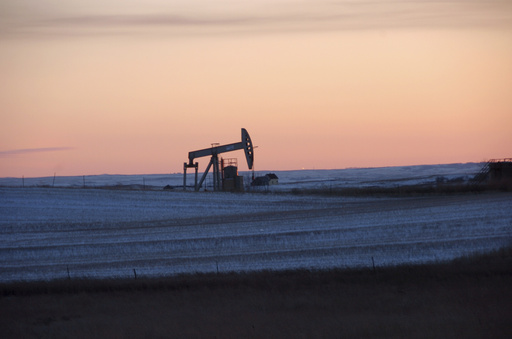BISMARCK, N.D. — Donald Trump has tasked Doug Burgum, the governor of North Dakota, with a crucial role as Secretary of the Interior, emphasizing the administration’s pro-drilling stance with the mantra “Drill baby drill.”
This nomination has reignited concerns among environmental advocates, who worry about the potential implications for public lands and climate change, reminiscent of the legal battles and policies that marked Trump’s initial presidential term.
Burgum, a well-off entrepreneur from the software industry who has roots in farming, appears to be a more moderate selection compared to other candidates considered for the Cabinet. His track record as a popular governor who aligns himself with conservation efforts, inspired by figures like Teddy Roosevelt, suggests an approach focused on collaboration rather than a hostile takeover of the agency.
Experts on public lands believe that this collaborative nature may facilitate his confirmation process and allow the new administration to expedite plans to increase development and utilization of public lands.
John Leshy, who held the position of Interior’s solicitor during the Clinton administration, described Burgum as a credible choice for the role, highlighting that he is not an extremist advocate against public lands. Leshy, now a professor at the University of California College of the Law, noted Burgum’s moderate stance.
The Department of the Interior is responsible for managing roughly 20% of the nation’s land, which encompasses a variety of priorities including wildlife conservation, recreation, and resource extraction, while also addressing treaty commitments with Native American tribes.
Most federal lands are situated in the Western United States, where tensions often arise between federal authorities, private landowners, and state leaders. Such disputes can escalate into significant confrontations, particularly with groups opposed to federal oversight.
If confirmed, Burgum would have to navigate pending litigation involving the U.S. Supreme Court, where Utah is asserting state control over lands administered by the Interior Department. Although North Dakota’s attorney general supports this lawsuit, Burgum’s office has not disclosed his position on the matter.
Recently, the U.S. Justice Department asked the Supreme Court to dismiss Utah’s claims, arguing that the state forfeited its rights to these lands upon achieving statehood in 1894.
Trump’s singular focus on fossil fuels is reminiscent of his campaign strategy from 2016, albeit with a reduced emphasis on coal—an industry that struggled during his previous term. Throughout his recent campaign, Trump praised oil as invaluable, significantly neglecting any discussions surrounding coal.
Currently, around 26% of America’s oil production occurs on federal lands and offshore areas managed by the Interior Department. Despite Trump’s assertions of federal drilling hindrances, oil production levels have reached record highs under Biden’s leadership.
However, industry advocates and Republican supporters are pushing for increased oil and gas leasing from federal lands, particularly in offshore regions like the Gulf of Mexico and Alaskan waters. They anticipate that Burgum will be instrumental in advancing oil and gas initiatives, significantly aided by efficiency programs led by figures such as billionaire Elon Musk.
The Biden administration has adjusted leasing practices, reducing the number and scope of lease sales while reinstating environmental regulations that were previously relaxed during Trump’s term. Biden pledged further limits on drilling to combat climate challenges, although he ultimately reached concessions in the 2022 climate bill requiring that renewable energy leasing follow the holding of offshore oil and gas sales.
As Erik Milito, representing the National Ocean Industries Association, stated, “Oil and gas generate substantial revenue, but securing that income hinges on effective leasing.” Milito mentioned that with Burgum in office, the outlook for energy development could be significantly favorable.
While it remains uncertain if Burgum will reinstate some contentious policies enacted during Trump’s first term, such as relocating agency officials from Washington, dismantling parts of the Endangered Species Act, and diminishing the size of national monuments created under the Obama administration, the past few years have seen officials under Biden actively reverse many of Trump’s actions.
Under Biden, onshore oil and gas lease sales have sharply declined, revealing only a fraction of the prior acreage sold annually during previous administrations, while numerous renewable energy projects have seen advancements.
Oil lease development can be lengthy, with several companies having vast tracts of land that remain untapped. Biden’s administration has also prioritized conservation in land management decisions, emphasizing a balance with resource extraction practices, including proposals to safeguard certain areas to protect threatened species such as the greater sage grouse.
Burgum’s state has been active in opposing Biden’s public lands regulations, claiming that proposed climate initiatives have disrupted laws intended to foster development by obstructing drilling, livestock grazing, and other resource uses.
The boom in oil production in North Dakota over the past two decades has largely been powered by advancements in extraction technology. Burgum has supported the oil industry, even repealing a state oil tax increase that was favored by industry representatives last year.
Following his nomination, Burgum reiterated Trump’s vision for U.S. energy dominance globally, highlighting the potential for improved collaboration among developers, tribes, landowners, and outdoor enthusiasts while focusing on responsible resource utilization.
Under the guidance of Secretary Deb Haaland, the Interior Department has made strides towards enhancing collaboration with tribes, especially regarding energy projects. Additionally, Haaland has worked to address issues related to missing and murdered Indigenous peoples and has led efforts to acknowledge historical injustices faced by Native American communities.
Burgum’s history includes cooperation with tribal entities in North Dakota on matters of oil development. Nevertheless, local conservation advocates like Shannon Straight suggest that while Burgum promotes tourism and outdoor activities, this advocacy has not translated into stronger protections for North Dakota’s landscapes.
Straight emphasized the importance of ensuring that the standards of conservation represented by individuals like Theodore Roosevelt are actually practiced, advocating for heightened protections in the state’s environmental policies.
Burgum has expressed support for the establishment of the Theodore Roosevelt Presidential Library in Medora, North Dakota, which reflects his commitment to the state’s historical and natural legacy.




